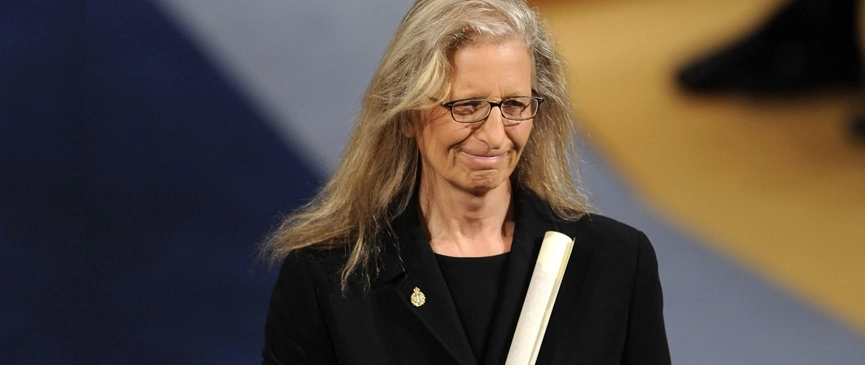Main content
Annie Leibovitz Prince of Asturias Award for Communication and Humanities 2013

What an extraordinary honor. I’m deeply grateful and humbled to be with you tonight. You have put me in the company of many wonderful artists, writers, composers, architects, and filmmakers. I’m thinking especially of one previous recipient who meant a great deal to me: Susan Sontag.
As proud as I am to be here, I feel an even deeper pride to represent the medium of photography. Fifteen years ago, in 1998, another photographer, Sebastiao Salgado, who is an inspiration to so many, received a prize from the Foundation.
For me, photography represents life itself. It is communication, and it allows the sharing of experience. It enables us to show others what we see—the things that fascinate us, the people and places we love and hold dear. Some photographers bring light to our difficulties and discontents, the things that betray us and hold us back. Others take us to worlds we could never visit, or help us better understand people we would otherwise never know.
At the same time, with a camera we can retain the vanishing moments of our lives. A photograph can ensure that we remember—for example—the amazing view that enchants us in the moment we see it, but then leaves our sight. Or the memorable event; the place we visit once; our children who grow up and change so quickly. The people we love and learn from. The happy, sad, profound moments which animate and enrich all our days. Photography has always had this incredible power to still and hold on to the present—before it disappears into the past.
And yet the value of photography as a serious enterprise has been in question since the invention of cameras. For a long time, the question was whether or not photography was Art. It was finally decided that the answer was Yes, but now the question is whether or not photography is actually dead.
There are conferences about this.
At one of these conferences it was recently proposed that while photography might not be dead, it was very likely that photographers were.
Here during the same era when more people than ever before have accepted photography as an art form, others wonder whether the still image will survive at all—in this age of digital imaging, camera phones, easily accessible video capture, and the ever-increasing importance of television and the internet over the photographic object and the printed page. Is photography less special than ever, less meaningful, now that anyone can take a picture, that millions are made every second, and that no one is certain whether or how all these digital images will survive?
The truth is that photography was created precisely so that anyone could make an image. So that anyone, of any class, at any station of life, could possess an image of themselves, or their family and friends, or the landscapes and views and things that were meaningful to them. The power of photography is the power to share our experiences with others, across differences of time and geography and education and belief. The power to show what otherwise might not be believed. The power to stop and hold onto the moments that rush by us.
But being a photographer is a choice.
I understood at a young age that what I did mattered. In the early 1970s, I was fortunate enough to be part of a magazine, Rolling Stone, where I was taken seriously. As seriously as a girl who worked at a magazine in the 1970s could be taken.
My life flowed from one assignment to another. I used to photograph rock and roll concerts and I would never hear the music. It took everything I had to look. I was swallowed up by the looking. I felt as good as my last photograph. If I took a good picture, I was elated, alive. If my pictures were not good, it was awful. I was a failure, depressed. Until the next good photograph.
I was a photojournalist at first and sort of backed into portraiture. Portraiture gave me the latitude to pick a side, have an opinion, be conceptual, and still tell stories. I don’t have the social skills that a lot of good portraitists have, but I love photography. The photograph has always come first.
To the photographer, photography isn’t just a record. It is the expression of a point of view. It is the photographer’s job to express that point of view as skillfully and thoughtfully as they can, using their talent and experience and intuition.
It is the photographer who registers the experience of sight and who transforms the image into an afterimage.
I believe, humbly, that this honor you’ve given me tonight expresses the conviction that photography has incredible power. That even though it is changing, the image is more relevant, and has more force in our lives, than ever before.
Thank you very much.
End of main content
